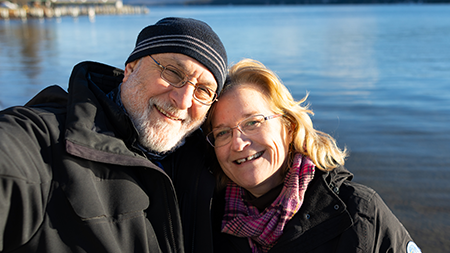

Cecilia and her care partner were compensated by Bristol Myers Squibb for sharing their stories.
How to make the biggest difference in the CAR T treatment journey as a care partner
Care partners play an essential role during the ABECMA treatment journey. It’s true that your loved one will be taken care of by highly trained medical professionals. But they may also need practical and emotional support before, during, and after their ABECMA infusion.
This information is shared for general support only and should not be taken as medical advice. Always check with a doctor or nurse for medical guidance.

How can I help while considering
CAR T cell therapy or after choosing ABECMA?
- Take notes and ask questions at the doctor’s office
- Help to schedule appointments
- Organize and share medical and insurance information with the healthcare team
- Help with day-to-day tasks, such as driving, meals, laundry, and cleaning
- Learn about the Cell Therapy 360® assistance program
- Arrange travel and lodging near the certified treatment center (once ABECMA is chosen, and if not utilizing Cell Therapy 360)

How can I help
during treatment?
- Help to schedule pre-infusion treatment appointments
- Communicate with doctors and the healthcare team
- Help arrange travel to/from appointments
- Support your loved one during their appointments
- Prepare things to help them be more comfortable during longer appointments like a snack or drink, a device with movies downloaded, or a blanket
- Have all important documents and information handy

How can I help after treatment?
- Look for symptoms, side effects, and other changes in health and/or behaviors

Two common side effects related to CAR T cell therapy are cytokine release syndrome (CRS) and neurologic toxicities. Common signs and symptoms include:
- Fever
- Difficulty breathing
- Rapid heart rate
- Headaches
- Tremors
- Confusion

Call 911 and the healthcare team at the first sign of these symptoms or any situation requiring urgent medical attention
- Severe chest pain
- Difficulty breathing
- Seizure or seizure-like activity
- Dramatic changes in consciousness
- Symptoms of stroke
- Severe vomiting or diarrhea
- Blurred vision
- Trouble speaking
What to consider when helping a loved one
Talk to their doctor for specific care guidance
Take care of yourself
As a care partner, you are a significant part of your loved one’s healthcare team. Much of the day-to-day responsibility falls on the care partner. The role can be demanding and overwhelming at times. It is important to take care of yourself – nutrition and rest are just as essential for the care partner as they are for your loved one.

You need sleep, too. Talk with the healthcare team if your loved one’s condition does not allow you to get enough sleep every night. Make sure you are taking measures for healthy sleep habits

Talk with the healthcare team if you need help with physical or emotional support

You need to eat and hydrate. Don't skip meals. Have snacks available for you and your loved one

It is okay to alternate care partners if you need to take a break or have another important commitment. Coordinate with friends and family to ensure your loved one has coverage while you get the help and support you need

Reach out to your family and friends for help with things like child or pet care, meal preparation, transportation, and household tasks
Being a care partner can be a lot of responsibility. It's okay to share these duties
with more than one person so that you can also take care of yourself.

Angelo and his care partner were compensated by Bristol Myers Squibb for sharing their stories.

Meet Courtney
Courtney shares her journey as a care partner helping her husband Angelo through his multiple myeloma diagnosis and treatment journey with ABECMA.

If ABECMA has made a difference for you or your loved one, we'd love to hear about it. Please visit www.SharetoInspire.com or call us at 1-855-436-5866.


